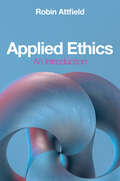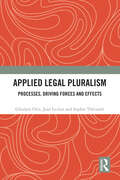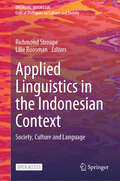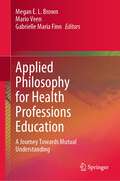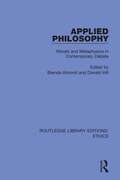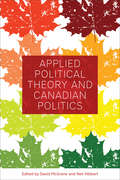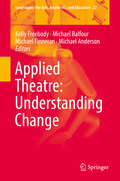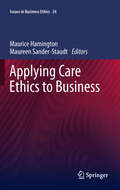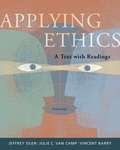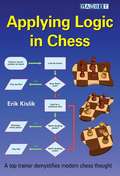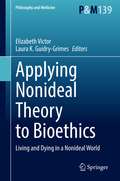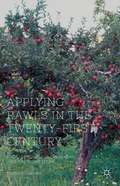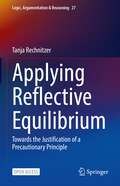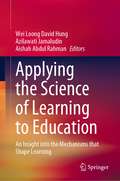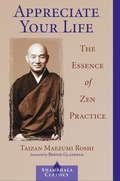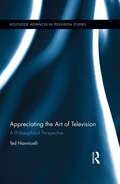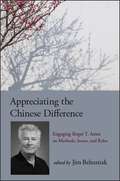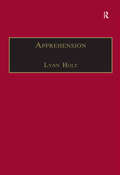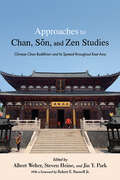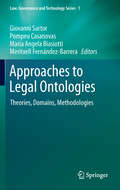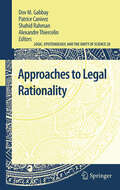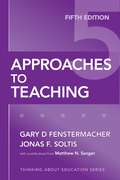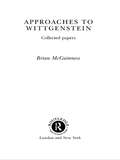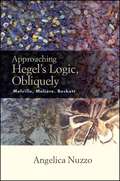- Table View
- List View
Applied Ethics: An Introduction
by Robin AttfieldPhilosophy has provided us with a wealth of moral and ethical theories. Applied ethics is the study of practical moral issues and our best philosophical theories, and how each can inform the other. Acclaimed philosopher and textbook author Robin Attfield invites students to reflect on the key problems of our time. Through lively case studies of topics related to health care, international development, the environment, abortion, punishment and more, he reveals how standard ethical theories can be tested on these real-life scenarios and, if necessary, revised or discarded. Students are encouraged to be their own philosophers, exploring and reaching coherent stances across a wide range of areas of everyday concern. Covering a typical applied ethics syllabus in a comprehensive and accessible manner, Applied Ethics will motivate philosophy students to engage with the most pressing moral issues of the twenty-first century.
Applied Legal Pluralism: Processes, Driving Forces and Effects
by Sophie Thériault Ghislain Otis Jean LeclairThis book offers a comparative study of the management of legal pluralism. The authors describe and analyse the way state and non-state legal systems acknowledge legal pluralism – defined as the coexistence of a state and non-state legal systems in the same space in respect of the same subject matter for the same population - and determine its consequences for their own purposes. The book sheds light on the management processes deployed by legal systems in Africa, Canada, Central Europe and the South Pacific, the multitudinous factors circumscribing the action of systems and individuals with respect to legal pluralism, and the effects of management strategies and processes on systems as well as on individuals. The book offers fresh practical and analytical insight on applied legal pluralism, a fast-growing field of scholarship and professional practice. Drawing from a wealth of original empirical data collected in several countries by a multilingual and multidisciplinary team, it provides a thorough account of the intricate patterns of state and non-state practices with respect to legal pluralism. As the book’s non-prescriptive approach helps to uncover and evaluate several biases or assumptions on the part of policy makers, scholars and development agencies regarding the nature and the consequences of legal pluralism, it will appeal to a wide range of scholars and practitioners in law, development studies, political science and social sciences.
Applied Linguistics in the Indonesian Context: Society, Culture and Language (Engaging Indonesia)
by Richmond Stroupe Lilie RoosmanThis open access edited volume presents a series of studies utilizing a variety of linguistic research techniques to investigate areas of language education, acquisition and assessment, contemporary political debate, modern and historical print media, and clinical language disorders, in the Indonesian context. In doing so, the authors provide a rich and diverse overview of current research in the fields of linguistics and applied linguistics. The initial section focuses on research conducted in educational settings, focusing on English-medium instruction (EMI), reading assessment, discovery-based learning, cultural elements in textbooks, and pre-service teacher preparation in Indonesia, offering recommendations for improving language education. The second section demonstrates the applications of corpus linguistics, focusing on collocation patterns in different languages, lexical use and context of rhetorical markers, and authorship determination. A third section presents investigations related to aspects of historical and contemporary language use in a variety of contexts, including advertisements, political debate, Indonesian print media, and translanguaging and multilingual writings, discussing the social and cultural dimensions of language use in Indonesia. The final section focuses on clinical linguistics, investigating the relationship between language disorders and language use, including spoken narratives provided by patients with Alzheimer's and the structure and time reference use of agrammatic speakers, with valuable insights into the understanding, diagnosis and treatment of language disorders. Brought together in a single volume, the chapters illustrate how linguistic analysis can be applied across a variety of disciplines and research sites. The volume is relevant to linguists, educators, sociologists, historians, and members of the medical community with particular interest in the Indonesian context.
Applied Philosophy for Health Professions Education: A Journey Towards Mutual Understanding
by Megan E. L. Brown Mario Veen Gabrielle Maria FinnThis book increases the accessibility of philosophical concepts to a wider audience within medical education, translating ‘knowing’ to ‘doing.’ It prompts health professions educators and researchers to consider the dynamics and structure of contemporary issues within health professions education in new, philosophical ways. Through considering the practical implications of applying philosophical concepts to contemporary issues, the book recommends avenues for further research and pedagogical change. Individual educators are considered, with practice points for teaching generated within each chapter. Readers will acquire practical ways in which they can change their own practice or pedagogy that align with the new insight offered through our philosophical analysis. These practical recommendations may be systemic in nature, but the authors of this book also offer micro-level recommendations for practitioners that can be considered as ways to improve individual approaches to education and research.
Applied Philosophy: Morals and Metaphysics in Contemporary Debate
by Brenda Almond Donald HillIn bringing the concepts and methods of philosophy to bear on specific, pressing, practical concerns, applied philosophy is the modern expression of a perennial concern: to understand, in part to control, and to come to terms with the conditions in which human life is to be lived. Originally published in 1991 and written by distinguished philosophers and academics from Europe, the USA and Australia, the essays collected in this volume examine subjects of continued concern and debate, such as the environment, personal relationships, terrorism and medicine. The contributions were originally published in the Journal of Applied Philosophy.
Applied Political Theory and Canadian Politics
by David McGrane Neil HibbertBringing together political theorists and specialists in Canadian politics, Applied Political Theory and Canadian Politics combines conceptual frameworks from political theory and empirical evidence to offer fresh perspectives on political events in contemporary Canada. Examining complex and timely subjects such as equality, social justice, democracy, citizenship, and ethnic diversity, contributors present current and archival research supplemented with insights drawn from political theory to give readers a deep and nuanced understanding of increasingly pressing issues in Canadian society. For scholars and students seeking a work of political theory that is tangible, focused, and connected to the real world of everyday politics, Applied Political Theory and Canadian Politics will be an important resource, combining philosophical insights and empirical evidence to enhance our understanding of contemporary Canadian politics.
Applied Theatre: Understanding Change (Landscapes: the Arts, Aesthetics, and Education #22)
by Michael Anderson Kelly Freebody Michael Balfour Michael FinneranThis volume offers researchers and practitioners new perspectives on applied theatre work, exploring the relationship between applied theatre and its intent, success and value. Applied theatre is a well-established field focused on the social application of the arts in a range of contexts including schools, prisons, residential aged care and community settings. The increased uptake of applied theatre in these contexts requires increased analysis and understanding of indications of success and value. This volume provides critical commentary and questions regarding issues associated with developing, delivering and evaluating applied theatre programs. Part 1 of the volume presents a discussion of the ways the concept of change is presented to and by funding bodies, practitioners, participants, researchers and policy makers to discover and analyse the relationships between applied theatre practice, transformative intent, and evaluation. Part 2 of the volume offers perspectives from key authors in the field which extend and contextualize the discussion by examining key themes and practice-based examples.
Applying Care Ethics to Business (Issues in Business Ethics #34)
by Maureen Sander-Staudt Maurice HamingtonApplying Care Ethics to Business is a multidisciplinary collection of original essays that explores the intersection between the burgeoning field of care ethics and business. Care ethics is an approach to morality that emphasizes relational, particularist, and affective dimensions of morality that evolved from feminist theory and today enjoys robust intellectual exploration. Care ethics emerged out of feminist theory in the 1980's and the greatest contribution to moral analysis among Women' Studies scholars. Today, feminists and non-feminist scholars are increasingly taking care ethics seriously. Applying care to the marketplace is a natural step in its maturity. Applying Care Ethics to Business is the first book-length analysis of business and economic cases and theories from the perspective of care theory. Furthermore, given economic turbulence and the resulting scrutiny of market practices, care ethics provides fresh and timely insight into ideal business values and commitments. In many ways, care ethics' emphasis upon connection and cooperation as well as the growth and well-being of the other make it appear to be the antithesis of the corporate character. Nevertheless, many contemporary theorists question if traditional moral approaches based on autonomous agents is adequate to address a shrinking and interconnected world--particularly one that is marked by global markets. Applying Care Ethics to Business offers a unique opportunity to rethink corporate responsibility and business ethics.
Applying Ethics: A Text With Readings
by Jeffrey Olen Julie C. Van Camp Vincent BarryDiscover the ethical implications and issues surrounding today's most compelling social dilemmas--from genetic engineering and cloning to terrorism and the use of torture--with APPLYING ETHICS: A TEXT WITH READINGS, 11th Edition. <p><p>Framed by the authors' helpful introductions and supported by a variety of readings and cases that reflect both sides of the topics being explored, this best-selling book offers a balanced introduction to ethics today.
Applying Ethics: A Text with Readings (9th edition)
by Jeffrey Olen Julie C. Van Camp Vincent BarryThis book introduces students to ethics via a well-proven formula of engaging commentary, seminal readings, and thought-provoking cases drawn from a wide range of contemporary social debates.
Applying Logic in Chess
by Erik KislikChess is a hard game. Although that may sound like the most obvious statement ever, it is important not to downplay how complicated chess really is. Once you internally accept the difficulty of chess, it is much easier to aim for improvement in chess rather than perfection.
Applying Nonideal Theory to Bioethics: Living and Dying in a Nonideal World (Philosophy and Medicine #139)
by Laura K. Guidry-Grimes Elizabeth VictorThis book offers new essays exploring concepts and applications of nonideal theory in bioethics. Nonideal theory refers to an analytic approach to moral and political philosophy (especially in relation to justice), according to which we should not assume that there will be perfect compliance with principles, that there will be favorable circumstances for just institutions and right action, or that reasoners are capable of being impartial. Nonideal theory takes the world as it actually is, in all of its imperfections. Bioethicists have called for greater attention to how nonideal theory can serve as a guide in the messy realities they face daily. Although many bioethicists implicitly assume nonideal theory in their work, there is the need for more explicit engagement with this theoretical outlook. A nonideal approach to bioethics would start by examining the sociopolitical realities of healthcare and the embeddedness of moral actors in those realities. How are bioethicists to navigate systemic injustices when completing research, giving guidance for patient care, and contributing to medical and public health policies? When there are no good options and when moral agents are enmeshed in their sociopolitical viewpoints, how should moral theorizing proceed? What do bioethical issues and principles look like from the perspective of historically marginalized persons? These are just a few of the questions that motivate nonideal theory within bioethics. This book begins in Part I with an overview of the foundational tenets of nonideal theory, what nonideal theory can offer bioethics, and why it may be preferable to ideal theory in addressing moral dilemmas in the clinic and beyond. In Part II, authors discuss applications of nonideal theory in many areas of bioethics, including reflections on environmental harms, racism and minority health, healthcare injustices during incarceration and detention, and other vulnerabilities experienced by patients from clinical and public health perspectives. The chapters within each section demonstrate the breadth in scope that nonideal theory encompasses, bringing together diverse theorists and approaches into one collection.
Applying Rawls in the Twenty-First Century
by Martin D. CarcieriJohn Rawls is the most influential political thinker of the twentieth century. Most of the scholarly literature on Rawls defends, critiques, or elaborates on some aspect of his theory. These writings are often valuable, yet this book goes beyond them. Like a few scholars, rather than debating whether and how Rawls got things right or wrong, Martin Carcieri take his well-defended principles of justice - especially the equal liberty, fair equality of opportunity, and difference principles atthe core of his theory - as given and apply them to aspects of four major, enduring, concrete domestic policy, ethical, and constitutional issues. These applications yield counter-intuitive implications that will challenge the ideological left and right alike, contributing to our understanding both of Rawls and of these issues. At the core, this book deepens our understanding of these issues and points the way toward rational, just policy reform.
Applying Reflective Equilibrium: Towards the Justification of a Precautionary Principle (Logic, Argumentation & Reasoning #27)
by Tanja RechnitzerThis open access book provides the first explicit case study for an application of the method of reflective equilibrium (RE), using it to develop and defend a precautionary principle. It thereby makes an important and original contribution to questions of philosophical method and methodology. The book shows step-by-step how RE is applied, and develops a methodological framework which will be useful for everyone who wishes to use reflective equilibrium. With respect to precautionary principles, the book demonstrates how a rights-based precautionary principle can be constructed and defended. The case study succeeds in demonstrating that RE can be successfully applied and puts real constraints on the justification process. This is all the more remarkable as the case study was designed as an open-ended process, without presupposing any specific results. This book will be highly relevant both to people interested in philosophical methodology and epistemology, as well as to researchers who are interested in using philosophical methods and tools and applying them to practical problems.
Applying the Science of Learning to Education: An Insight into the Mechanisms that Shape Learning
by Azilawati Jamaludin Wei Loong David Hung Aishah Abdul RahmanThis book provides an overview of the various 'Science of Learning' (SoL) research projects led by researchers at the National Institute of Education, Nanyang Technological University, Singapore, and international research collaborators. It presents the goals and rationale behind the Science of Learning in Education (SoLE) initiative and examines a spectrum of topics relevant to bolstering our understanding of the science underlying learning. The Science of Learning (SoL) is an advancing field, with proponents extolling its potential impact on educational practice. This book investigates the possible correlations or causal relationships between brain functioning and development, physiology, environment factors, and their impact on learning. It promotes an interdisciplinary approach to understanding biological to behavioural mechanisms of learning that are oriented toward optimizing and maximizing every learner’s potential.
Appreciate Your Life: The Essence of Zen Practice
by Wendy Egyoku Nakao Eve Myonen Marko Taizan MaezumiHere is the first major collection of the teachings of Taizan Maezumi Roshi (1931-1995), one of the first Japanese Zen masters to bring Zen to the West and founding abbot of the Zen Center of Los Angeles and Zen Mountain Center in Idyllwild, California. These short, inspiring readings illuminate Zen practice in simple, eloquent language. Topics include zazen and Zen koans, how to appreciate your life as the life of the Buddha, and the essential matter of life and death. Appreciate Your Life conveys Maezumi Roshi's unique spirit and teaching style, as well as his timeless insights into the practice of Zen. Never satisfied with merely conveying ideas, his teisho, the Zen talks he gave weekly and during retreats, evoked personal questions from his students. Maezumi Roshi insisted that his students address these questions in their own lives. As he often said, "Be intimate with your life." The readings are not teachings or instructions in the traditional sense. They are transcriptions of the master's teisho, living presentations of his direct experience of Zen realization. These teisho are crystalline offerings of Zen insight intended to reach beyond the student's intellect to her or his deepest essence.
Appreciating the Art of Television: A Philosophical Perspective (Routledge Advances in Television Studies)
by Ted NannicelliContemporary television has been marked by such exceptional programming that it is now common to hear claims that TV has finally become an art. In Appreciating the Art of Television, Nannicelli contends that televisual art is not a recent development, but has in fact existed for a long time. Yet despite the flourishing of two relevant academic subfields—the philosophy of film and television aesthetics—there is little scholarship on television, in general, as an art form. This book aims to provide scholars active in television aesthetics with a critical overview of the relevant philosophical literature, while also giving philosophers of film a particular account of the art of television that will hopefully spur further interest and debate. It offers the first sustained theoretical examination of what is involved in appreciating television as an art and how this bears on the practical business of television scholars, critics, students, and fans—namely the comprehension, interpretation, and evaluation of specific televisual artworks.
Appreciating the Chinese Difference: Engaging Roger T. Ames on Methods, Issues, and Roles (SUNY series in Chinese Philosophy and Culture)
by Jim BehuniakIn this volume, prominent philosophers working in Chinese thought and related areas critically reflect upon the work of Roger T. Ames, one of the most significant contemporary figures working in the field of Chinese philosophy. Through his decades of collaborative work in comparative methodology and cross-cultural interpretation, along with a number of pathbreaking translations of Chinese philosophical texts, Ames has managed to challenge standing paradigms and open fresh avenues of research into the Chinese tradition. His work will be read and studied for years to come.The original essays presented here, which are substantive philosophical contributions in their own right, cover the full range of Ames's scholarly output. They address methodological questions as well as specific issues in textual interpretation, including ample discussion of Ames's most recent and provocative contribution: Confucian "role ethics." In the final section of the book, Ames responds to each essay. The result is a conversation and engagement that both underscores the vitality of his thinking and indicates the directions it may take in the future. Altogether, this work provides a snapshot of a remarkable career—and an invitation to continue reflecting upon its meaning and importance.
Apprehension: Reason in the Absence of Rules
by Lynn HoltThis book introduces and explores the role of apprehension in reasoning - setting out the problems, determining the vocabulary, fixing the boundaries, and questioning what is often taken for granted. Lynn Holt argues that a robust conception of rationality must include intellectual virtues which cannot be reduced to a set of rules for reasoners, and argues that the virtue of apprehension, an acquired disposition to see things correctly, is required if rationality is to be defensible. Drawing on an Aristotelian conception of intellectual virtue and examples from the sciences, Holt shows why impersonal standards for rationality are misguided, why foundations for knowledge are the last elements to emerge from inquiry not the first, and why intuition is a poor substitute for virtue. By placing the current scene in historical perspective, Holt displays the current impasse as the inevitable outcome of the replacement of intellectual virtue with method in the early modern philosophical imagination. Written in an engaging and jargon-free style, this book is of interest to a wide range of readers, particularly epistemologists and philosophers of science concerned with the fate of reason.
Approaches to Chan, Sŏn, and Zen Studies: Chinese Chan Buddhism and Its Spread throughout East Asia (SUNY series in Chinese Philosophy and Culture)
by Albert Welter; Steven Heine; Jin Y. ParkThis volume focuses on Chinese Chan Buddhism and its spread across East Asia, with special attention to its impacts on Korean Sŏn and Japanese Zen. Zen enthralled the scholarly world throughout much of the twentieth century, and Zen Studies became a major academic discipline in its wake. Interpreted through the lens of Japanese Zen and its reaction to events in the modern world, Zen Studies incorporated a broad range of Zen-related movements in the East Asian Buddhist world. As broad as the scope of Zen Studies was, however, it was clearly rooted in a Japanese context, and aspects of the "Zen experience" that did not fit modern Japanese Zen aspirations tended to be marginalized and ignored. Approaches to Chan, Sŏn, and Zen Studies acknowledges the move beyond Zen Studies to recognize the changing and growing parameters of the field. The volume also examines the modern dynamics in each of these traditions.
Approaches to Legal Ontologies: Theories, Domains, Methodologies (Law, Governance and Technology Series #1)
by Giovanni Sartor Mariangela Biasiotti Meritxell Fernández-Barrera Pompeu CasanovasThe book provides the reader with a unique source regarding the current theoretical landscape in legal ontology engineering as well as on foreseeable future trends for the definition of conceptual structures to enhance the automatic processing and retrieval of legal information in the Semantic Web framework. It will thus interest researchers in the domains of the SW, legal informatics, Artificial Intelligence and law, legal theory and legal philosophy, as well as developers of e-government applications based on the intelligent management of legal or public information to provide both back-office and front-office support.
Approaches to Legal Rationality (Logic, Epistemology, and the Unity of Science #20)
by Dov M. Gabbay Patrice Canivez Shahid Rahman Alexandre ThiercelinLegal theory, political sciences, sociology, philosophy, logic, artificial intelligence: there are many approaches to legal argumentation. Each of them provides specific insights into highly complex phenomena. Different disciplines, but also different traditions in disciplines (e.g. analytical and continental traditions in philosophy) find here a rare occasion to meet. The present book contains contributions, both historical and thematic, from leading researchers in several of the most important approaches to legal rationality. One of the main issues is the relation between logic and law: the way logic is actually used in law, but also the way logic can make law explicit. An outstanding group of philosophers, logicians and jurists try to meet this issue. The book is more than a collection of papers. However different their respective conceptual tools may be, the authors share a common conception: legal argumentation is a specific argumentation context.
Approaches to Teaching (5th edition)
by Jonas F. Soltis Gary D. Fenstermacher Matthew N. SangerThis popular text continues using the format of the three approaches--The Executive, The Facilitator, and The Liberationist. For the Fifth Edition, the authors add four new case studies: "Scripted Teaching," "Accountability and Merit," "What is the Value of Caring Relationships?" and "School Funding. " Using these and other realistic case studies, they explore the strengths and weaknesses of each approach so that teachers can critically assess their own philosophical positions on teaching. Teachers are urged to ask themselves such questions as: What is the main goal of teaching? What is the most important purpose of education? What do I expect my students to eventually become? Is the way I structure my teaching influenced by how I view my role and goals? This updated edition also adds a new section called "Topics and Resources" to encourage further inquiry into teaching
Approaches to Wittgenstein: Collected Papers
by Brian McGuinnessApproaches to Wittgenstein brings together for the first time the many varied aspects of Wittgenstein's life, philosophy, and aesthetic attitudes.
Approaching Hegel's Logic, Obliquely: Melville, Moliere, Beckett (SUNY series, Intersections: Philosophy and Critical Theory)
by Angelica NuzzoWinner of the 2020 Hegelpd-Prize presented by the University of Padova Research GroupIn this book, Angelica Nuzzo proposes a reading of Hegel's Logic as "logic of transformation" and "logic of action," and supports this thesis by looking to works of literature and history as exemplary of Hegel's argument and method. By examining Melville's Billy Budd, Molière's Tartuffe, Beckett's Endgame, Elizabeth Bishop's and Giacomo Leopardi's late poetry along with Thucydides' History in this way, Nuzzo finds an unprecedented and productive way to render Hegel's Logic alive and engaging. She argues that Melville's Billy Budd is the most successful embodiment of the abstract movement of thinking presented in Hegel's Logic, connecting Billy Budd's stutter to the puzzlingly inarticulate beginning of Hegel's Logic, "Being, pure Being," identical with "Nothing," and argues that the Logic serves as an especially appropriate tool for understanding the sudden violent action that strikes Claggart dead. Through these and other readings, Nuzzo finds a fresh way to address interpretive issues that have remained unresolved for almost two centuries in Hegel scholarship, and also presents well-known works of literature in an entirely new light. This account of Hegel's Logic is framed by the need for an interpretive tool able to orient our understanding of the contemporary world as mired in an unprecedented global crisis. How can the story of our historical present—the tragedy or the comedy we all play parts in—be told? What is the inner logic of our changing world?
